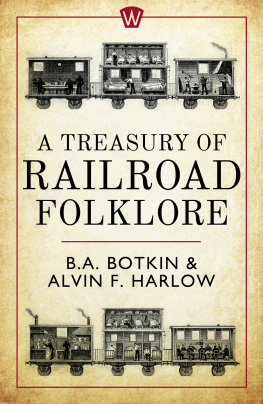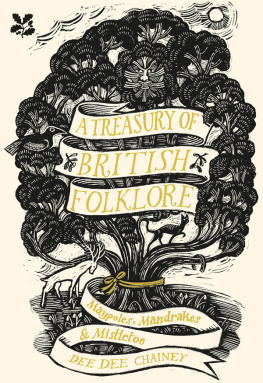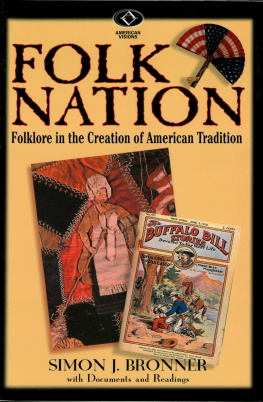B. A. Botkin - A Treasury of Railroad Folklore
Here you can read online B. A. Botkin - A Treasury of Railroad Folklore full text of the book (entire story) in english for free. Download pdf and epub, get meaning, cover and reviews about this ebook. year: 2015, publisher: Head of Zeus, genre: Detective and thriller. Description of the work, (preface) as well as reviews are available. Best literature library LitArk.com created for fans of good reading and offers a wide selection of genres:
Romance novel
Science fiction
Adventure
Detective
Science
History
Home and family
Prose
Art
Politics
Computer
Non-fiction
Religion
Business
Children
Humor
Choose a favorite category and find really read worthwhile books. Enjoy immersion in the world of imagination, feel the emotions of the characters or learn something new for yourself, make an fascinating discovery.
- Book:A Treasury of Railroad Folklore
- Author:
- Publisher:Head of Zeus
- Genre:
- Year:2015
- Rating:4 / 5
- Favourites:Add to favourites
- Your mark:
- 80
- 1
- 2
- 3
- 4
- 5
A Treasury of Railroad Folklore: summary, description and annotation
We offer to read an annotation, description, summary or preface (depends on what the author of the book "A Treasury of Railroad Folklore" wrote himself). If you haven't found the necessary information about the book — write in the comments, we will try to find it.
A Treasury of Railroad Folklore — read online for free the complete book (whole text) full work
Below is the text of the book, divided by pages. System saving the place of the last page read, allows you to conveniently read the book "A Treasury of Railroad Folklore" online for free, without having to search again every time where you left off. Put a bookmark, and you can go to the page where you finished reading at any time.
Font size:
Interval:
Bookmark:


www.headofzeus.com

The rails go westward in the dark. Brother, have you seen starlight on the rails? Have you heard the thunder of the fast express?
Thomas Wolfe

The folklore of the railroader, like his personality, is inevitably shaped by his occupation. To mirror the one through the other and to give a picture of railroading as a way of life and of railroad folklore as a way of looking at life is the purpose of this book. The impact of the railroad on the American imagination has been greater than that of any other industry, and for good reason. As a widespread, accurately timed, intimately subdivided, highly co-ordinated activity, in the words of W. Fred Cottrell, railroading is perhaps the prototype of modern industrialism. At the same time, like seafaring, it preserves a tradition of individual courage, high emprise, and wanderlust. Like a ship, an engine is called she, and not merely because she wears apron, collar, yoke, binder, muffler, jacket, cap, bonnet, petticoat, shoes, pumps, hose, sleeve, wrapper, hood, and sash, according to the old wheeze. An engine is a thing of beauty, with a whim of iron, for a man to master or be mastered by. And her romance is inseparable from her reality.
That last goes for railroading as a wholea business for many men, says Robert S. Henry, a hobby for others, an absorbing passion for some. Every one can become part of its fabulous adventure by riding on trains or by simply watching them. And waving at trains is the time-honored, universal symbol of the non-railroaders participation, if only vicarious, in the vastness and excitement of their drama. It would be hard to conceive of America without trains, both being a place (in Thomas Wolfes words) where miracles not only happen, but where they happen all the time. James Norman Hall goes a step further: I can no more conceive of a world without railroads and trains to run on them than I can imagine wishing to live in such a world.
But not all the fascination of trains lies in what a writer in 1882 called the fastness of life on the rail the suggestion of change, of constant excitement, of being always on the move and seeing new places, new people, and new things out of the common run. This collection appears at the end of an era in railroad history, so that for a good many Americans brought up in the Age of Steam, a good deal of the charm of trains lies in the nostalgic pleasure of a slow train to yesterday, when the local flourished and everybody was a neighbor.
This book grew out of a suggestion of Sylvester L. Vigilante, former chief of the American History Room of the New York Public Library, who was also responsible for bringing together as editorial collaborators a railroad historian and a folklorist. Each has brought to his task a special approach and point of view.
The historian has regarded railroadiana as a kind of lore, in which anecdote, personal narrative of railroad experience and travel, illustrate and illuminate the history of railroad development and the railroaders occupation, especially the quaint ideas and methods of the early days. In his many reminiscent pieces and compilations as well as in the extracts from his other works in the transportation field, he has drawn upon personal experience as well as wide and detailed knowledge. He has been chiefly responsible for the section, Apprentice Years, the sub-section, Banditti of the Rails, and the Appendix. He would have liked to see as a motto for the book the words of Don Herold:
I like trains! The human race has been going to pieces on me pretty fast lately. On the whole, I think we are a sad and sorry sight. But trains are a human institution, and they are pretty nearly perfect, and they restore to some extent my esteem for the mankind who made them. I like the kind of people who run trains. There always seems to be something trustworthy and fatherly in a railroad engineer or the conductor who punches your ticket. Railroads, being regular, seem to attract regular people not crackpots.
The folklorist has regarded railroadiana primarily as a body of traditional or own stories (including legends, yarns, tall tales, jests, and ballads) such as railroaders swap or might have swapped, told as nearly as possible in their own idiom, which recreate for the reader the railroaders life and way of looking at life, on and off the job, especially the dramatic, human interest, and humorous stories. He has been chiefly responsible for the sub-sections, Rail Stiffs, Tools and Tricks of the Trade, Told in the Roundhouse, The Passenger Is Always Right, and the section, Blues, Ballads, and Work Songs. He would like to have chosen as the books motto these lines from W. Fred Cottrells The Railroader:
Around this young giant [in the nineteenth century] there grew a mythology that made a romance of railroading, a romance not yet dead but now grown retrospective. No matter how humble his own role, a railroader long felt himself in some degree superior for being a soldier in so glorious an army.
Designed as a Treasury, in the Folklore Series, the book makes no attempt to be encyclopedic or historically complete. Otherwise it would have fallen into the error of the correspondent who wrote to the Association of American Railroads: Please send me the Association of American Railroads. A book of this type resembles a railroad in that it takes things from one place and puts them in another. Something inevitably gets lost or overlooked in the shuffle.
B. A. B.
Croton-on-Hudson, N. Y.
October 31, 1953
Iron Horses and Iron Men

Mrs. Houstoun, an English tourist of the 1850s, remarked, as she rode around on American trains, I really think there must be some natural affinity between Yankee keep-moving nature and a locomotive engine. Whatever the cause, it is certain that the humans seem to treat the ingine, as they call it, more like a familiar friend than as the dangerous and desperate thing it really is.
Primarily, the American railroad man, both as builder and as operator, was freer than his European counterpart from the rigidity of custom and system. This freedom was part of the American character as developed by the new, heady atmosphere of liberty and by the challenge of the American wilderness and its vast natural resources. Freed from the restrictions of the Old World, American mechanical genius expanded and blossomed, sometimes a little wildly. Railroad lines, tossed hastily into new territory while rule-making lagged behind, threw trainmen on their own responsibility and bred ingenuity in meeting problemsthen mostly unexpected onesas well as a considerable degree of recklessness. Familiar friend though the engine might be, in Mrs. Houstouns words, unknown dangers lurked in its path and called for desperate expedients, in which Yankee genius was as fertile as it was in invention.
But as lines lengthened, equipment improved, became more massive and intricate and consequently higher in danger potentials, the railroad man became steadier, better educated, more deeply impressed with his responsibilities, more capable of coping with problems. Rules, regulations, and mechanical devices have increased enormously in number and in the near infinitude of their effort to cover every situation. Yet even the rule-makers know that there is a realm beyond the rule-booksa region of crises and emergencies, where the railroaders judgment and courage must take over. And it is a matter of record that he has seldom failed to do his best, even at the cost of his own life or limb.
Font size:
Interval:
Bookmark:
Similar books «A Treasury of Railroad Folklore»
Look at similar books to A Treasury of Railroad Folklore. We have selected literature similar in name and meaning in the hope of providing readers with more options to find new, interesting, not yet read works.
Discussion, reviews of the book A Treasury of Railroad Folklore and just readers' own opinions. Leave your comments, write what you think about the work, its meaning or the main characters. Specify what exactly you liked and what you didn't like, and why you think so.







